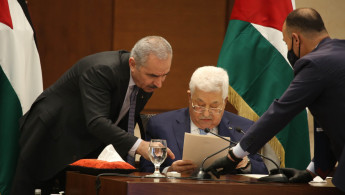Follow us on Facebook, Twitter and Instagram to stay connected
Palestinian Authority-backed protest against annexation attracts low turn out
With loudspeakers mounted, Palestinian flags unfurled and civil servants allowed off work, everything appeared set for a large protest in Ramallah against Israel's annexation plans in the occupied West Bank.
But only 200 people turned up for the June 8 demonstration, in a sign of the struggles the Palestinian Authority (PA), lead by Mahmoud Abbas, has faced generating outrage on the street against the prospective Israeli moves.
International condemnation of possible Israeli annexations has mounted ahead of July 1, when the Jewish state could take its first steps toward implementing part of a US-proposed Middle East peace plan.
Read more: As annexation looms, no one is ready to hold Israel accountable
President Donald Trump's proposals, rejected outright by the Palestinians, pave the way for annexing key parts of the West Bank, including settlements long considered illegal by the majority of the international community.
But on Palestinian streets, mobilisation against looming Israeli actions has been muted.
"There is fatigue," Palestinian analyst Nour Odeh told AFP.
"Fatigue from the usual - to stand in Ramallah and wait for the cameras to show how angry we are," she added.
"You're talking to yourself, and then what?"
There was a substantially larger rally in the West Bank city of Jericho on Monday, where crowds sang in unison and hoisted banners declaring "Palestine is not for sale," in condemnation of the Trump plan.
The crowd of several thousand was brought to the protest site on buses chartered by the event organisers - the Palestine Liberation Organization and Fatah party - but many left even before the speeches began.
Odeh said the malaise was driven in part by frustration with Palestinian leaders who "promised to deliver peace through negotiation, (but) they failed."
Israel has occupied the West Bank since the 1967 Six Day War.
The 1993 Oslo peace accords were designed to end the Israeli-Palestinian conflict and establish the scope of Palestinian autonomy in the West Bank.
But nearly three decades on, doubts have grown among some Palestinians about their leaders' ability to secure a deal with Israel that would be accepted on the Palestinian streets.





 Follow the Middle East's top stories in English at The New Arab on Google News
Follow the Middle East's top stories in English at The New Arab on Google News
![The UAE is widely suspected of arming the RSF militia [Getty]](/sites/default/files/styles/image_330x185/public/2024-11/GettyImages-472529908.jpg?h=69f2b9d0&itok=Yauw3YTG)
![Netanyahu furiously denounced the ICC [Getty]](/sites/default/files/styles/image_330x185/public/2024-11/GettyImages-2169352575.jpg?h=199d8c1f&itok=-vRiruf5)
![Both Hamas and the Palestinian Authority welcomed the ICC arrest warrants [Getty]](/sites/default/files/styles/image_330x185/public/2024-11/GettyImages-2178351173.jpg?h=199d8c1f&itok=TV858iVg)